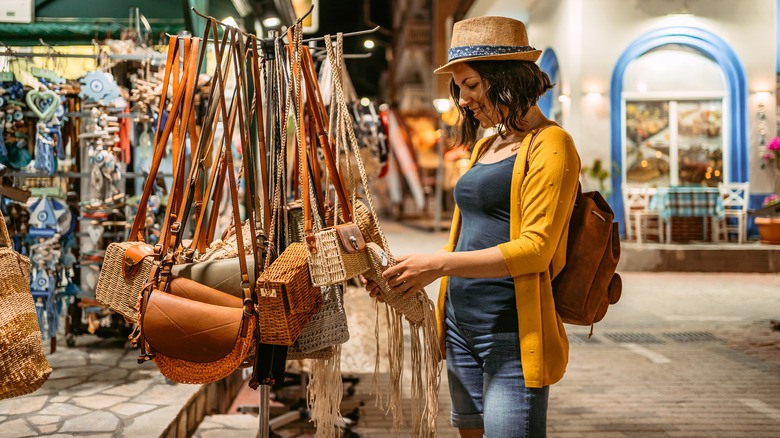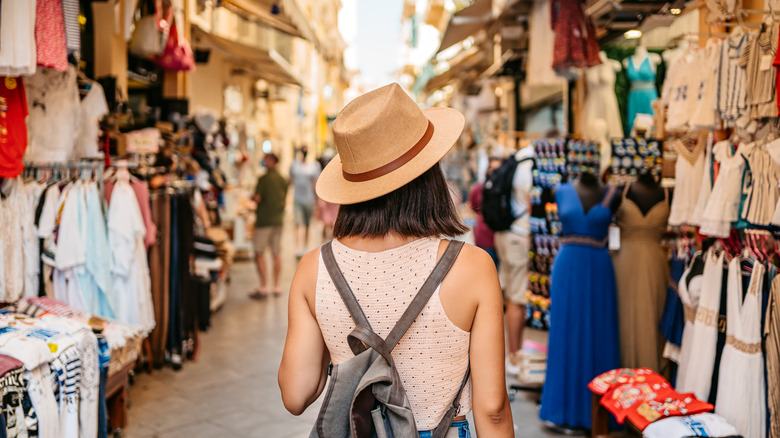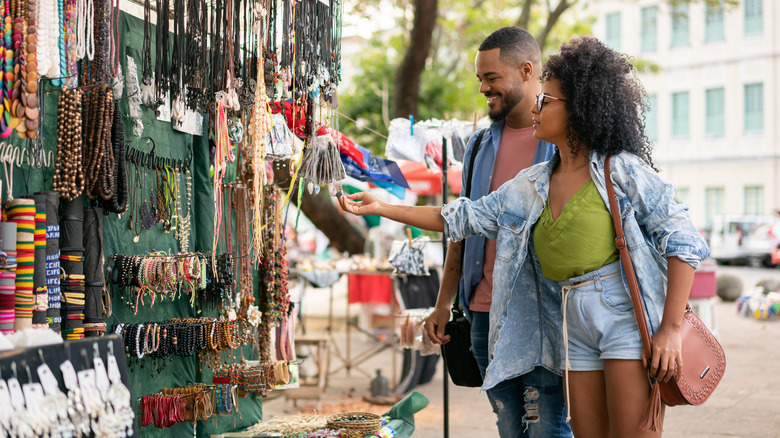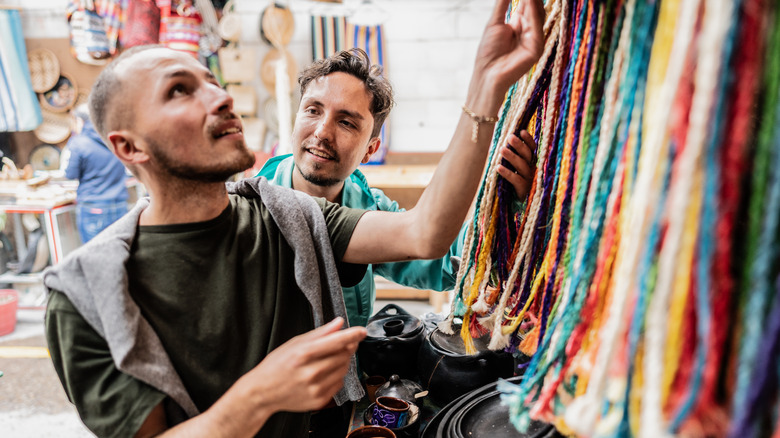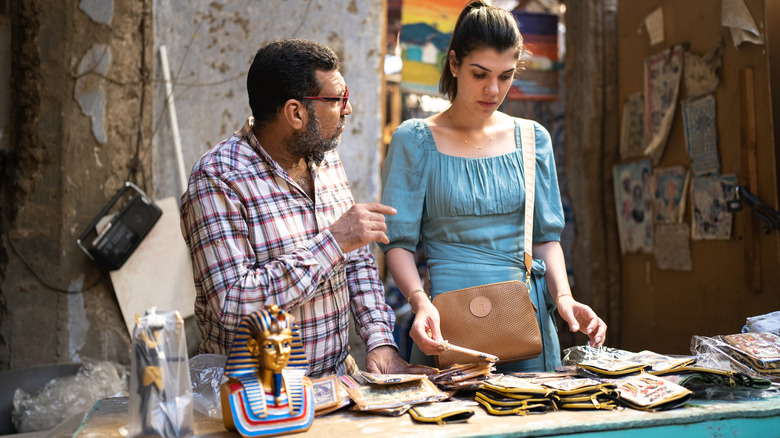Rick Steves Shares His Clever Tips To Confidently Bargain Like A Professional Overseas
Bargaining, haggling, negotiating — the act has many names, but the same purpose: to get whatever you're trying to buy for a lower price. Whether you're hitting up a Moroccan souk, getting lost in Istanbul's Grand Bazaar's more than 5,000 stores, or checking out Europe's most famous Christmas markets, haggling is an art form. In fact, in many places, it's even considered a cultural tradition.
However, according to travel expert and writer, Rick Steves, there's a fine line between bargaining and arguing — and it's important not to cross it. After all, haggling with a merchant can be an exciting way to feel like "one of the locals," but it can also lead to some pretty uncomfortable situations if done wrong.
Luckily, Steves' years of travel experience have made him an expert haggler. Sharing tips on his website, he notes that one of the most important things to do when haggling is deciding whether or not negotiating for a new price is appropriate in that specific context. Once you've figured that out, it's all about determining how much you're willing to pay, staying respectful, and knowing when to walk away. Master these, and you'll save some pretty pennies while shopping for that perfect souvenir abroad.
Look around before choosing your items
According to Steves' list of tips, you should always start your haggling journey with a quick look around the market to scope out prices. While most stalls might have a lot of the same things, prices can easily vary from one seller to another for no apparent reason other than the seller trying to squeeze a little more out of tourists who don't mind paying extra.
This random change in prices is especially true if the items aren't marked with a price tag — which generally means there will be a different price for foreigners and locals. In cases like these, it's always helpful to bring along a local — whether it's a tour guide or a friend — who can help you navigate the conversation and let you know when someone is trying to overcharge you for something.
Then, once you've had a look around and determined which stalls have a better deal, it'll be a lot easier for you to try and negotiate the price down. Keep in mind, however, that coming back to a stall will probably show the seller that you're really interested in purchasing from them — meaning that you might lose a little ground when trying to bring the price down further. This shouldn't be a deal-breaker, though, as most sellers are used to it.
Figure out the price of an item
Let's say you had a look around, checked the prices, and found the perfect item you're ready to buy. This is where the fun starts. First things first, always let the seller give you their price first — and never, under any circumstances, let them coerce you into telling them how much the item costs. If a merchant hits you with a "How much do you want to pay?", play the game and ask them "No, no... I don't know... how much do you sell it for?". Sellers will usually cave after one or two back-and-forths, and you'll have an idea of the "market" price without setting yourself up for a loss.
From there, you can then gauge how much you're actually willing to pay for whatever you're after, and even get a better idea of how much the seller is willing to sell it to you for. When you start to negotiate, you'll also want to slash that price by about 50% and work around that number. Some sellers might laugh it off, but don't be discouraged by this reaction — it's all part of the process.
Sure, trying to get something for half the price feels a little aggressive, but you'll eventually reach a happy medium that feels fair. And whatever you do, Steves suggests that you ignore the price tags if there do happen to be any — these are usually there to trick people into haggling down to less than what's feasible.
Don't act over-excited
Whatever you find and whatever you do, another one of Steves' most important haggling tips is that you never show the seller you're too excited or too interested in the product. If you do, and they see it, they'll have a lot more leverage over the situation and how much you're willing to pay — and they'll definitely use that to their advantage. Instead, try to keep your poker face on and act like you couldn't care less about whatever you're buying. If the merchant's price is still too high after a healthy dose of haggling, shrug your shoulders, thank them, and walk away slowly. In most cases, the seller will yell out a price — this is usually their final price — as a means to bring you back and close the deal.
If they don't call you back, simply count your losses and try to find the item again at a different stall. You'll be a lot more prepared to offer a price that's in line with their expectations, and learn when to stop, a second time around.
Always pay in cash
When it comes to bargaining like the locals do, it's important that you carry around cash — local currency, that is — to pay for whatever you're buying. Even if the merchant takes payments via card, Steves suggests that it'll be a lot easier to haggle down the price if you're paying with bills instead of using your credit card. Plus, most merchants will actually prefer this method anyway since it means they're not getting charged any extra fees by the card machine issuer. It's a win-win.
Having cash on hand also means you can actually show the merchant how much you're willing to pay, Steve notes. In fact, it's even considered a smart move to just pull out your money and show them directly that it's all the cash you have left. Plus, it's a lot more impactful to hold a handful of bills and coins than trying to wave a single piece of plastic around.
Be patient, friendly, and respectful
Haggling is a marathon, not a sprint. This means that you need to be prepared for things to take a little longer, for there to be a lot more back and forth, and for the playfulness and banter of the interaction to go on until both parties reach a price they're happy with.
Like with any social interaction, haggling isn't exempt from basic social rules. Don't come in too strong, make sure you greet the vendor before asking for a price and always show respect throughout the interaction. A great tip to make things a little lighter is to learn a few phrases in the local language to kick-start the conversation. You'll be surprised to see how far a "Hello" or "How much?" in the local lingo actually goes — and how much it can do to create some camaraderie between you and the seller.
Most importantly, though, is to never insult the seller by offering too little — especially if you have the means and are trying to bargain hard in a poorer country. After all, being a considerate tourist also applies to shopping. This usually means no lowballing, no penny-pinching, and absolutely no disparaging remarks. Keep in mind that it's the seller's job to actually sell these things for a profit, and trying to cheat them out of a living with a measly offer doesn't do anyone any favors.
